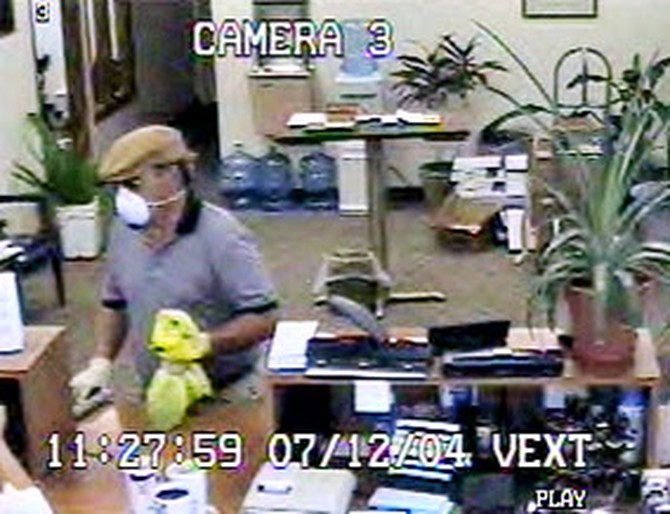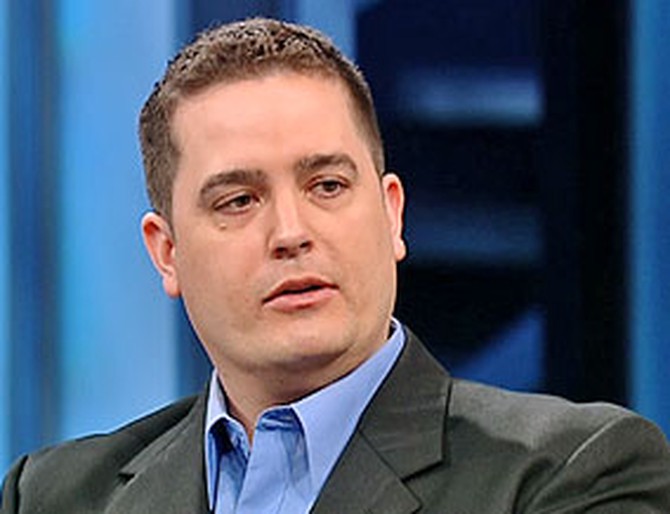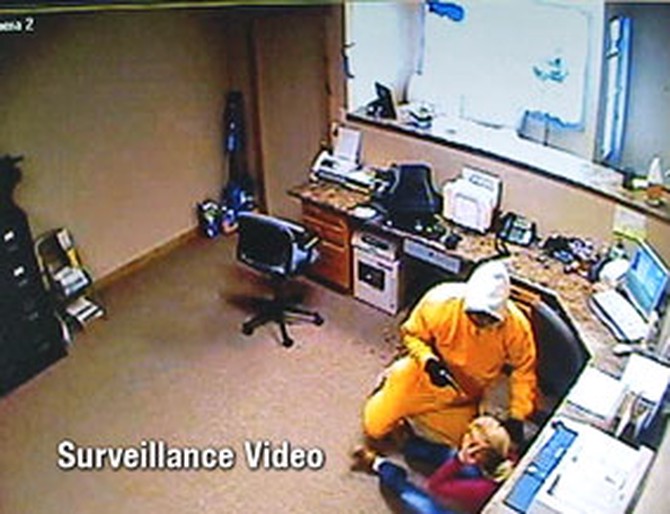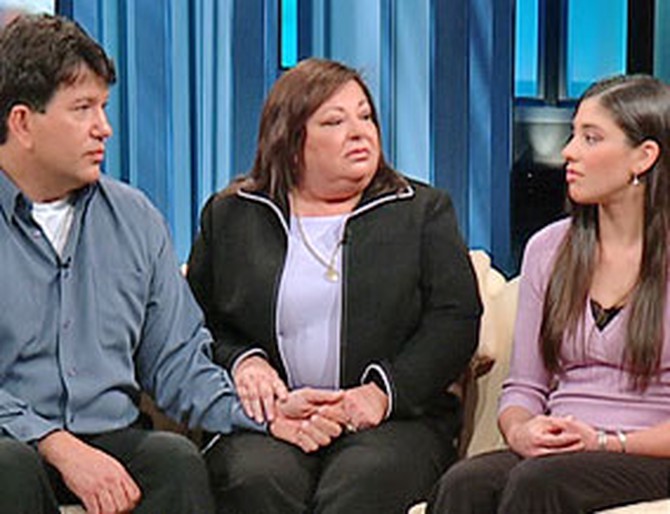Behind the Headlines

William Ginglen was the kind of dad who was a stickler for good manners and for obeying the law. His three grown sons—Jared, Garrett and Clay—fondly remember him saying, "If you ever get in trouble with the police, you better hope they get to you before I do."
For most of his life, William, a former Marine, was a true pillar of his community. In recent years, he'd lost his job and seemed to be in a downward spiral. Though he would often borrow money from his sons, their relationship remained close and they would see each other often. "He was one of us, basically," Clay says.
Then on August 19, 2004, Jared, a Peoria, Illinois, police officer, read a story in the paper about a series of bank robberies in another part of the state. "The description just oddly matched my father to a tee," Jared says. "The description of the vehicle—the getaway car—was the same vehicle my father drove. And he spends time over in that area."
In addition, Jared says, the description in the report described the suspect as being 5'8" to 5'10" and around 200 pounds. "My father and I are about the same size. That almost describes me, only [I am] younger," he says.
As Jared continued reading, he noticed that the newspaper story referenced a website set up by local police authorities that contained surveillance photos of one of the robberies. "Just to clear up my own mind, [I thought] I'd go look and make sure that it wasn't him," Jared says. "But it was."
For most of his life, William, a former Marine, was a true pillar of his community. In recent years, he'd lost his job and seemed to be in a downward spiral. Though he would often borrow money from his sons, their relationship remained close and they would see each other often. "He was one of us, basically," Clay says.
Then on August 19, 2004, Jared, a Peoria, Illinois, police officer, read a story in the paper about a series of bank robberies in another part of the state. "The description just oddly matched my father to a tee," Jared says. "The description of the vehicle—the getaway car—was the same vehicle my father drove. And he spends time over in that area."
In addition, Jared says, the description in the report described the suspect as being 5'8" to 5'10" and around 200 pounds. "My father and I are about the same size. That almost describes me, only [I am] younger," he says.
As Jared continued reading, he noticed that the newspaper story referenced a website set up by local police authorities that contained surveillance photos of one of the robberies. "Just to clear up my own mind, [I thought] I'd go look and make sure that it wasn't him," Jared says. "But it was."

Jared had no doubts about the robber's identity. "The outfit he wore in this particular surveillance video was the last outfit I saw him in," he says. "He was at a birthday party, and he was wearing the same outfit." And, according to news accounts, the gun William wielded in that video was a nickel-plated .45...a present from Garrett!
Shocked by what he had uncovered, Jared called Garrett. To make sure that Garrett was not influenced by his own suspicions, Jared simply asked his brother to look at the police website. "He immediately hung up on me," Jared recalls. "He had to deal with it in his own way."
When Clay was equally sure that the man in the photo was their father, the three brothers agreed to confront William about their suspicions. "We wanted to say, 'Look, we know what you're doing, we want it to stop, and you've got to turn yourself in,'" Jared says.
However, when they arrived, William was not at home. The brothers decided that the severity of the crimes made any delay in their action irresponsible. They contacted the local police.
Shocked by what he had uncovered, Jared called Garrett. To make sure that Garrett was not influenced by his own suspicions, Jared simply asked his brother to look at the police website. "He immediately hung up on me," Jared recalls. "He had to deal with it in his own way."
When Clay was equally sure that the man in the photo was their father, the three brothers agreed to confront William about their suspicions. "We wanted to say, 'Look, we know what you're doing, we want it to stop, and you've got to turn yourself in,'" Jared says.
However, when they arrived, William was not at home. The brothers decided that the severity of the crimes made any delay in their action irresponsible. They contacted the local police.

When police searched William's home, they found the evidence they needed to prove he was the criminal in the surveillance photos. Along with the clothes he was wearing during the crime and the gun he carried, they found a journal that outlined a "secret" life, filled with marital infidelities and the use of drugs like crack cocaine.
William's secret behavior cemented the brothers' belief that they'd acted correctly. "To find out he had this [secret] double life going on was what angered me so much. That he could [cheat on and lie to] my mother," Jared says. "Nobody messes with Mom."
William was sentenced to 40 years in prison after pleading guilty to seven bank robberies.
Though this has been a difficult time in the brothers' lives, they say they in no way regret their decision to notify the police. "It really wasn't a choice," Clay says. "It was just what we had to do. The ironic thing is that's what we learned to do growing up. He helped us in learning how to make quick decisions, and he made it really clear that you tell the truth."
William's secret behavior cemented the brothers' belief that they'd acted correctly. "To find out he had this [secret] double life going on was what angered me so much. That he could [cheat on and lie to] my mother," Jared says. "Nobody messes with Mom."
William was sentenced to 40 years in prison after pleading guilty to seven bank robberies.
Though this has been a difficult time in the brothers' lives, they say they in no way regret their decision to notify the police. "It really wasn't a choice," Clay says. "It was just what we had to do. The ironic thing is that's what we learned to do growing up. He helped us in learning how to make quick decisions, and he made it really clear that you tell the truth."

Clay, Garrett and Jared each feel differently about being a part of their father's life again. Jared feels he experienced closure at the trial. "I just have to look at it this way: I'm done," he says, "I don't have a father. There's a man in prison [who's] not my father. It's a different person."
"I carry an anger with me that I hope will go away," Garrett says. "I hope someday that I can feel I can go see him."
"Part of healing is trying to promote the positive aspects of this whole situation," Clay points out. "The fact is, he's alive and no one got hurt."
"I carry an anger with me that I hope will go away," Garrett says. "I hope someday that I can feel I can go see him."
"Part of healing is trying to promote the positive aspects of this whole situation," Clay points out. "The fact is, he's alive and no one got hurt."

One terrifying, headline-making robbery was caught on surveillance cameras. Angi, a clerk in her family's check-cashing store, had just arrived at work when a robber burst in and began attacking her. The intruder was dressed from head to toe in yellow, so at first Angi says she thought that someone was playing a prank on her. "A yellow banana basically jumped over the counter," she says. "I thought, 'If someone was attacking me, he'd be wearing black.' Then, when the gun was in my face ... I realized, 'Nope, this is not a joke.'"
The robber tried to tie her up and cover her mouth with masking tape, but Angi fought back. Suddenly the phone rang and the robber attempted to yank the cord out of the wall—instead, he merely knocked the phone off the hook. Angi's husband, Cy, was on the other end of the phone. He listened helplessly to what was happening, then hung up and called 911. "It was the worst experience of my life to hear [her pleas for help] and to hear how scared she was," Cy remembers.
When the robber tried to take Angi down the hall into a bathroom, she says a red flag went up. "I remembered from watching [self-defense expert Sanford Strong on] Oprah a long time ago—'Don't ever let your attacker take you to that second location.' ... That's why I thank you," she tells Oprah. "'I thought, 'If he takes me to this bathroom, I'm not coming out.'"
Although the other offices in the building were empty that weekend, Angi convinced her attacker he'd be spotted by other tenants if he moved her to the bathroom. She then warned him that he'd likely be caught if he hung around any longer.
The robber tried to tie her up and cover her mouth with masking tape, but Angi fought back. Suddenly the phone rang and the robber attempted to yank the cord out of the wall—instead, he merely knocked the phone off the hook. Angi's husband, Cy, was on the other end of the phone. He listened helplessly to what was happening, then hung up and called 911. "It was the worst experience of my life to hear [her pleas for help] and to hear how scared she was," Cy remembers.
When the robber tried to take Angi down the hall into a bathroom, she says a red flag went up. "I remembered from watching [self-defense expert Sanford Strong on] Oprah a long time ago—'Don't ever let your attacker take you to that second location.' ... That's why I thank you," she tells Oprah. "'I thought, 'If he takes me to this bathroom, I'm not coming out.'"
Although the other offices in the building were empty that weekend, Angi convinced her attacker he'd be spotted by other tenants if he moved her to the bathroom. She then warned him that he'd likely be caught if he hung around any longer.

During the robbery, Angi recognized her attacker. "I kept thinking, 'I know this guy,'" Angi remembers. "How could he not know I'd recognize him? He's 6'6"! You don't forget a 6'6" guy!"
Angi realized the man had been in the store just three days earlier to get a loan! "[He] visited with me for about 20 minutes," she says. "I remember looking at him, going, 'Gee, he's a gentle giant.' He was really nice. I was not scared by him at all."
When applying for the loan, the man provided his home address—which police used to locate and arrest 28-year-old Junior Fea, who confessed to the robbery. Police also learned that the gun used in the robbery was a fake.
"We're so proud," Cy says of his wife. "It was scary to know as a husband there was nothing I could do, and I'm just so proud how she acted and just did everything she could to make sure she still could be my wife and a great mother to our kids. We're so thankful."
Angi realized the man had been in the store just three days earlier to get a loan! "[He] visited with me for about 20 minutes," she says. "I remember looking at him, going, 'Gee, he's a gentle giant.' He was really nice. I was not scared by him at all."
When applying for the loan, the man provided his home address—which police used to locate and arrest 28-year-old Junior Fea, who confessed to the robbery. Police also learned that the gun used in the robbery was a fake.
"We're so proud," Cy says of his wife. "It was scary to know as a husband there was nothing I could do, and I'm just so proud how she acted and just did everything she could to make sure she still could be my wife and a great mother to our kids. We're so thankful."

Nineteen-year-old Suzanne Gonzales seemed to have a life full of potential and promise. She was a gifted student from California who attended Florida State University on a full scholarship. "She was a person who was not afraid to march to her own beat," Suzanne's father, Mike, remembers. "She was just a joy and a light." Suzanne's sister, Jennifer, treasured the special bond the two shared. "We were best friends," she says. "We did everything together."
Though the family was 3,000 miles apart, Suzanne's parents and sister talked to her several times a week on the phone and believed she was doing well. "She loved Tallahassee; she loved going to school," says Mike.
Then, on March 23, the Gonzales' lives were changed forever. First, they received a frantic call that Suzanne was missing. A few hours later, police confirmed Suzanne was dead. After cleaning her apartment, feeding her kittens and checking into a local hotel, Suzanne committed suicide by ingesting a lethal dose of cyanide.
"I wonder if she was scared," says a tearful Jennifer. "But mostly I just think about her being alone. Dying alone."
Though the family was 3,000 miles apart, Suzanne's parents and sister talked to her several times a week on the phone and believed she was doing well. "She loved Tallahassee; she loved going to school," says Mike.
Then, on March 23, the Gonzales' lives were changed forever. First, they received a frantic call that Suzanne was missing. A few hours later, police confirmed Suzanne was dead. After cleaning her apartment, feeding her kittens and checking into a local hotel, Suzanne committed suicide by ingesting a lethal dose of cyanide.
"I wonder if she was scared," says a tearful Jennifer. "But mostly I just think about her being alone. Dying alone."

In lieu of a traditional suicide note, Suzanne's family received an e-mail the day of her death. The note was intentionally scheduled to arrive after Suzanne had already killed herself, ensuring her family had no way to stop her. Suzanne wrote: "If you haven't heard by now, I have passed away. I know I should have told you, but I have been depressed and suicidal for a long, long time. It is all right to be sad, and it is all right to cry. These types of things tend to happen. It really isn't that big a deal. Death is just another part of life."
Suzanne's suicide stunned her family. The last time Jennifer saw her sister, she remembered Suzanne seemed pale and a little stressed, but Jennifer attributed the change in behavior to the normal stresses of college life.
Her mother, Mary, had spoken to Suzanne the day before her death and noticed nothing out of the ordinary. "She called me at my office," Mary says, "She said, 'Mom, I just wanted to say hi, see how you're doing today and tell you I love you."
Suzanne's suicide stunned her family. The last time Jennifer saw her sister, she remembered Suzanne seemed pale and a little stressed, but Jennifer attributed the change in behavior to the normal stresses of college life.
Her mother, Mary, had spoken to Suzanne the day before her death and noticed nothing out of the ordinary. "She called me at my office," Mary says, "She said, 'Mom, I just wanted to say hi, see how you're doing today and tell you I love you."

As Suzanne's family started investigating the details of her suicide, they made a shocking discovery. The Suzanne they thought they knew so well had been leading a secret life online, visiting a website that describes itself as "pro-choice" toward suicide.
Suzanne's parents found nearly 100 postings on the website that she had written prior to her death. Her first messages express what seems like normal teenage angst. "I'm bored," she wrote. "I'm bored with life. I cannot possibly think of anything I want to do that is worth doing."
Her later posts reveal a newfound determination, and, in one of her final posts, she shares the method she's chosen to end her life: "Potassium cyanide," she wrote, "because it seems relatively painless and quick-acting." To that, one poster responded, "I hope your method works for you."
Suzanne's posts reveal concern for the effect of her suicide on her family. In one message, she expresses regret that her dad will have to deal with her death so soon after the death of his own father. In another post, she mentions postponing her suicide so that it didn't coincide with her sister's birthday. In her last message, Suzanne says goodbye to the people she chatted with on the website, "Bye everyone, see you on the other side."
The family believes Suzanne was convinced by the website that suicide was the only way to ease her depression. Although the Web is home to several sites that provide suicide methods and advice, Suzanne's family, like many others, had no idea such an online community existed. "I was shocked that there was something like that website," Mary says.
Suzanne's parents found nearly 100 postings on the website that she had written prior to her death. Her first messages express what seems like normal teenage angst. "I'm bored," she wrote. "I'm bored with life. I cannot possibly think of anything I want to do that is worth doing."
Her later posts reveal a newfound determination, and, in one of her final posts, she shares the method she's chosen to end her life: "Potassium cyanide," she wrote, "because it seems relatively painless and quick-acting." To that, one poster responded, "I hope your method works for you."
Suzanne's posts reveal concern for the effect of her suicide on her family. In one message, she expresses regret that her dad will have to deal with her death so soon after the death of his own father. In another post, she mentions postponing her suicide so that it didn't coincide with her sister's birthday. In her last message, Suzanne says goodbye to the people she chatted with on the website, "Bye everyone, see you on the other side."
The family believes Suzanne was convinced by the website that suicide was the only way to ease her depression. Although the Web is home to several sites that provide suicide methods and advice, Suzanne's family, like many others, had no idea such an online community existed. "I was shocked that there was something like that website," Mary says.

Suzanne's father Mike believes the site is to blame for discouraging alternatives to suicide. "They could have prevented it," he says. "They preach that if you're suffering from depression and are in pain that you're going to be in pain and suffer for the rest of your life. So why prolong it?"
Some might argue that Suzanne made the decision to visit the website of her own free will and therefore her family has no grounds to complain. Mike argues that the "pro-choice" website should really be called "pro-suicide. "Their philosophy is that suicide is the only option that you have," he says.
Suzanne's family is committed to changing laws so that they catch up with technology. They're working with congressional and state representatives. Their goal, Mike says, is to "have the laws changed so that individuals are held accountable and responsible for the harm and damage they do by manipulating vulnerable people."
Some might argue that Suzanne made the decision to visit the website of her own free will and therefore her family has no grounds to complain. Mike argues that the "pro-choice" website should really be called "pro-suicide. "Their philosophy is that suicide is the only option that you have," he says.
Suzanne's family is committed to changing laws so that they catch up with technology. They're working with congressional and state representatives. Their goal, Mike says, is to "have the laws changed so that individuals are held accountable and responsible for the harm and damage they do by manipulating vulnerable people."

Oprah viewers are making history! In November 2005, Ricky Martin and CNN's Christiane Amanpour gave an up-close view of what's been called the ugliest, most preventable man-made disaster in the world—the trafficking and prostitution of children, a $10 billion industry.
At the end of the show, Oprah asked viewers to take action. Thousands and thousands of you sent letters to Washington, urging your congressional representatives to acknowledge this tragedy and make stopping child sex trafficking a top priority. Oprah is gratified to announce the Trafficking Victims Protection Reauthorization Act—a bill that will provide support for victims as well as help prosecute sex trade customers and traffickers—has been signed into law by President Bush!
At the end of the show, Oprah asked viewers to take action. Thousands and thousands of you sent letters to Washington, urging your congressional representatives to acknowledge this tragedy and make stopping child sex trafficking a top priority. Oprah is gratified to announce the Trafficking Victims Protection Reauthorization Act—a bill that will provide support for victims as well as help prosecute sex trade customers and traffickers—has been signed into law by President Bush!
Published 01/25/2006

